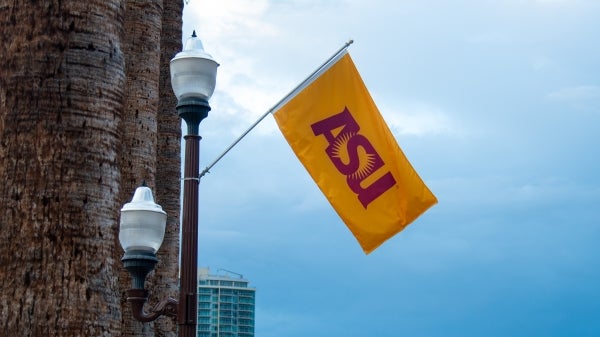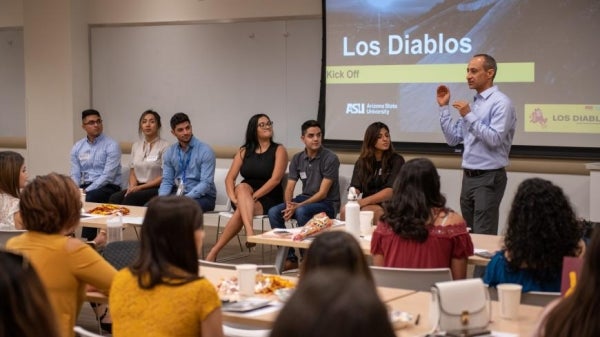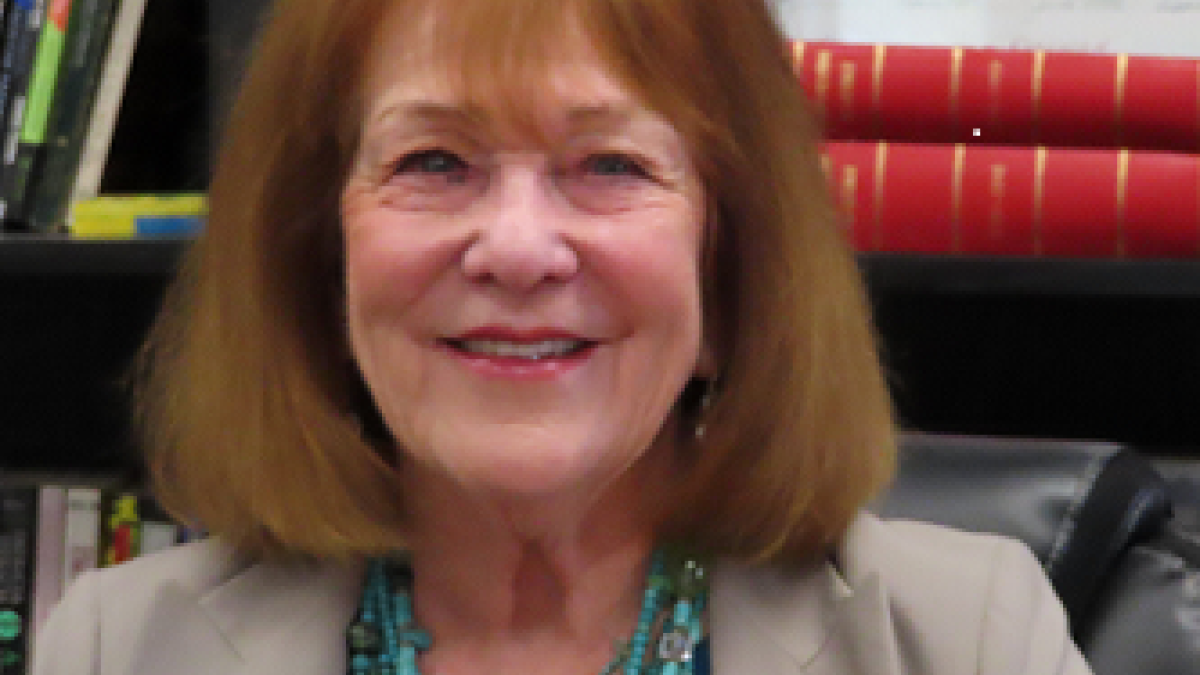Linda C. Lederman, director of the Hugh Downs School of Human Communication in the College of Liberal Arts and Sciences at Arizona State University has announced she will step down from the position effective July 1. Professor Paul Mongeau will serve as interim director beginning July 1.
READ MORE: ASU's Hugh Downs School names new interim director
A professor of health and human communication who has led the school since 2014, Lederman will take a yearlong research leave and then return to the faculty in August 2021.
“In her time at ASU, Linda Lederman has demonstrated outstanding leadership, drive and commitment while continuously striving for the advancement of the university and students,” said Patrick Kenney, dean of The College of Liberal Arts and Sciences.
“She exhibits tremendous civic duty, always responding to requests to serve ASU, The College, her school. We are grateful that she will continue to make a positive impact at the Hugh Downs School of Human Communication and The College in the classroom and through her impressive scholarly efforts.”
In addition to her administrative role at the Hugh Downs School, Lederman also served as dean of social sciences in The College of Liberal Arts and Sciences at ASU from 2007–2012, where she provided leadership and vision by expanding cross-campus collaborations with all departments and academic units at The College, and also, as the executive director of the Institute for Social Science Research in The College of Liberal Arts and Sciences at ASU. From 2006–2010, she led a research staff in the Institute for Social Science Research that facilitated scholars’ survey research, geographic information services and collaborative research technology.
Elizabeth D. Capaldi, provost and executive vice president at ASU at the time Lederman stepped down as dean said of her that she had “guided ASU’s social sciences schools, centers and programs through significant growth and change.”
Hugh Downs School Associate Professor Amira de la Garza, a member of the search committee that recruited Lederman to ASU in 2005 said of her: “I remember that from the very start, we were attracted by the balance of heart and mind in her scholarship. We had no idea at the time that it was precisely this attribute that would help her to lead us as a unit.”
Before joining the faculty at ASU in 2006, Lederman was a professor of communication at Rutgers University for more than 25 years, a member of the faculty of the Rutgers Center for Alcohol Studies and founding director of the Rutgers Center for Communication and Health Issues, one of the first research groups in the nation to study the role of communication in alcohol use and abuse. Lederman, who received her PhD from Rutgers in communication and information studies, was named Rutgers University Distinguished Graduate in the Social and Behavioral Sciences in 2010.
Lederman is nationally recognized for her use-inspired research on alcohol-abuse prevention, alcoholism and collegiate recovery, which has been funded by grants from federal agencies totaling more than $8 million. Her 14 published books include “Changing the Culture of College Drinking” and “Voices of Recovery from the Campus,” a collection of stories from people who began their recovery while undergraduate students.
Driven by this passion to educate people about alcoholism and recovery, ASU's College of Liberal Arts and Sciences named Lederman as the recipient of the Gary Kranbuhl Difference Maker Award in 2016.
“Dr. Lederman’s scholarship, service and teaching are seamlessly connected to the health and well-being of the broader ASU community,” wrote Cameron Thies and Mary Margaret Fonow, two distinguished professors and school directors who nominated her for this prestigious award.
Lederman’s impact extends beyond the ASU community. She has been invited in recent years to give a colloquium about her work on alcoholism and collegiate recovery at the University of Arizona Department of Communication, as well as asked to be a keynote speaker at the Rutgers University Graduation for Recovery Students, and this spring, she was a panelist on the Arizona Theatre Company’s production of White Chip, a play about alcoholism and recovery. In 2017, the Empty Space Theatre in the Hugh Downs School presented a performance titled “Recovery,” based on her books and journal articles about communication, alcoholism and recovery.
Lederman also was a founding member of the board of ASU's Recovery Rising, a collegiate recovery program dedicated to supporting students throughout the recovery process. The program organizes Alcoholics Anonymous meetings and announces Narcotics Anonymous meetings at ASU and neighboring communities through its social media pages.
“For people who have alcoholism, the role of storytelling has been a profound part of many of the recovery programs that’s been successful in this country,” Lederman said. “Alcoholics Anonymous and 12 Step programs are about people who share the same problem getting together and telling the stories of what it’s like to experience addiction.”
Under her leadership, the Hugh Downs School has grown in its academic successes, many of which were detailed in the Academic Program Review of the school conducted in 2019. The report highlights the “exceptional morale and climate” at the school among students, staff and faculty, and referred to the Hugh Downs School as a “vibrant learning community.”
“Linda’s leadership challenged the faculty to be the best versions of themselves — in instruction, in research and school morale,” said Olga I. Davis, professor at the Hugh Downs School and associate dean at Barrett, The Honors College. “Having a leader who sees the vision of what you can become individually and collectively without clipping your wings is an astute leader and one who inspires by impression. No doubt, she has made an indelible impression on each of us, and hopefully, her collective work in building community in the school will continue.”
During her tenure, the Hugh Downs School had significant growth and success of its undergraduate program, introduced a popular online master’s degree, and hired seven assistant professors. Lederman also oversaw the creation and expansion of its six research collaboratives, previously known as “initiatives.” These collaboratives encourage faculty and graduate students to pursue mutually interesting and beneficial research. Under her helm, the collaboratives expanded to include partnerships with scientists and social scientists at ASU and in the medical industry, as well as community and faith-based organizations.
“Our previous ‘initiatives’ gradually evolved into powerful faculty ‘collaboratives,’ emphasizing transdisciplinary thinking and fostering of collaborative and intellectually inclusive imagination of what we could accomplish as a community of scholars,” de la Garza said. “The collaboratives have shifted our emphasis from linear thinking to dynamic openness to the possibilities of collaborative work between faculty, graduate students, and the communities we live in and serve."
Jennifer Linde, co-director of the I-4C research collaborative, and artistic director of The Empty Space says Lederman’s enthusiasm for community collaboration is unmatched.
“In her tenure as director, her creativity, passion, depth of knowledge, and commitment to faculty, students and community partners has built a lasting foundation for the Hugh Downs School.”
More University news

Lester Godsey joins ASU as chief information security officer
With a career spanning nearly three decades of professional IT experience, Lester Godsey is back where he first started — serving…

ASU a top-ranked university for graduate employability
Students usually seek higher education degrees to build their skills and aptitude in their chosen vocation, and advance their…

ASU Alumni Association to honor 3 outstanding alumni leaders during Homecoming
The Arizona State University Alumni Association will proudly recognize three innovative alumni leaders during the Homecoming…
